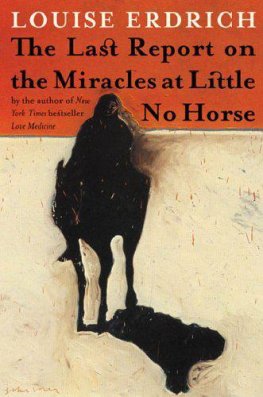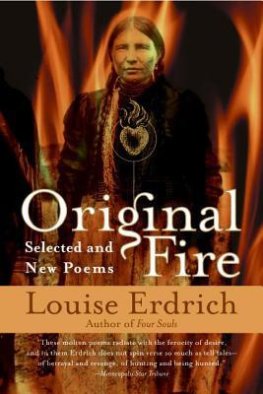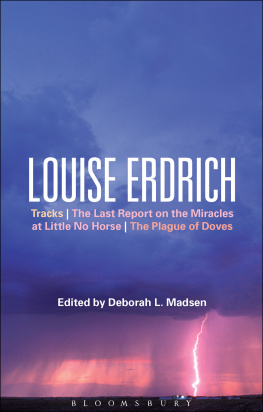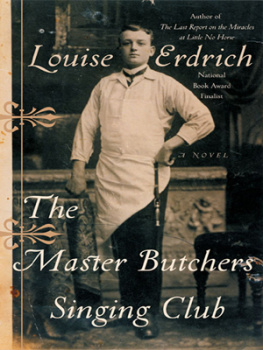Tracks on a Page
Louise Erdrich, Her Life and Works
Frances Washburn
WOMEN WRITERS OF COLOR

Copyright 2013 by Frances Washburn
All rights reserved. No part of this publication may be reproduced, stored in a retrieval system, or transmitted, in any form or by any means, electronic, mechanical, photocopying, recording, or otherwise, except for the inclusion of brief quotations in a review, without prior permission in writing from the publisher.
Library of Congress Cataloging-in-Publication Data
Washburn, Frances.
Tracks on a Page: Louise Erdrich, her life and works / Frances Washburn.
pages cm. (Women Writers of Color)
Includes bibliographical references and index.
ISBN 978-0-313-39257-3 (hardcopy : acid-free paper) ISBN 978-0-313-39258-0 (ebook) 1. Erdrich, Louise. I. Title.
PS3555.R42Z94 2013
813.54dc23
[B] 2013006763
ISBN: 978-0-313-39257-3
EISBN: 978-0-313-39258-0
17 16 15 14 13 1 2 3 4 5
This book is also available on the World Wide Web as an eBook.
Visit www.abc-clio.com for details.
Praeger
An Imprint of ABC-CLIO, LLC
ABC-CLIO, LLC
130 Cremona Drive, P.O. Box 1911
Santa Barbara, California 93116-1911
This book is printed on acid-free paper 
Manufactured in the United States of America
Recent Titles in Women Writers of Color
Joanne M. Braxton
Lucille Clifton: Her Life and Letters
Mary Jane Lupton
June Jordan: Her Life and Letters
Valerie F. Kinloch
Zora Neale Hurston: A Biography of the Spirit
Deborah G. Plant
Border Crossings and Beyond: The Life and Works of Sandra Cisneros
Carmen Hayde Rivera
Nikki Giovanni: A Literary Biography
Virginia C. Fowler
To all those wonderful women writers of color, who have shown
us the way. Pilamaya ye.
Contents
by Joanne M. Braxton
Series Foreword
The Women Writers of Color Series offers enjoyable reading for an enlightened multi-ethnic audience that includes scholars and critics, poets and writers, librarians and young adults, who read both critically and for entertainment; each volume is published with a user-friendly bibliography so that the readers can pursue original works by these women authors of color and find critical writings more easily.
The Women Writers of Color Series exists for every little girl of any race whoever wrote a poem and hid it, and for every woman writer of color whose work we will never know. This series is therefore not only for the scholar and the critic, but also for the daughters of those mothers whose creativity and intelligence were suppressed or denieddaughters who went on to become poets, essayists, novelists, and activists who inspired others in the creation of artistic models with the vision for a sustainable future.
Native American people, people of color, were here when the first Europeans and Africans arrived in the Americas, living in harmony with the earth; yet, they are underrepresented in the canon of American literature. Among these, Louise Erdrich is both popular and influential, a well-known novelist, poet, memoirist, and author of childrens books. The daughter of a German American father and an Ojibwe mother, she grew up in North Dakota and attended Dartmouth College before receiving a Master of Arts degree from Johns Hopkins University. To date, Erdrich has published 14 novels, winning the National Book Critics Circle Award and the Anisfield-Wolf Book Award, among others. A weaver of exquisitely rich narratives, Erdrich portrays the lives of people like those she has known, people who have struggled to retain their lands and their heritage. Her novels often read as if they were being spoken in the present moment; My girl, she writes, I have seen the passing of times you will never know. In this way, Erdrich invites her audiences to participate in the creation of meaning by transforming the act of reading into one of healing.
Louise Erdrichs triumph as a Native American and a woman of color writer is cause for celebration. We therefore welcome Tracks on a Page by Frances Washburn. Washburn, a novelist and professor of American Indian literature, is at once a scholar and a storyteller. Of Lakota/Irish/German/Anishinaabe heritage, Frances Washburn grew up on the stories of her Irish grandmother and her Lakota grandmother, historical stories of war and peace, homely stories that conveyed human values and the consequences of behavior, both good and bad. In addition to publishing two novels, Washburn has established her scholarly footing by publishing in American Indian Quarterly, American Indian Culture and Research Journal, Wicazo Sa, and Studies in American Indian Literature. In Tracks on a Page, Washburn follows Louise Erdrichs literary tracks like a seasoned hunter, offering rare insights into a little known journey.
Joanne M. Braxton
College of William and Mary Series Editor
ONE
The Earth from Which It Springs
Louise Erdrichs published works are both popular and critically acclaimedpopular in that her books are often on the New York Times Best Seller list, an indicatin that the general public buys large numbers of her books, and critically acclaimed in that her books earn excellent reviews and are often required reading in college literature classes. The combined honor is rare. Popular fiction is often disdained by university literature professors as being writing that appeals to the lowest common denominator. Stephen Kings works, for instance, have only recently become acceptable as a topic for literature classessomething that was probably helped when many of his novels, such as The Green Mile and The Shawshank Redemption, were made into movies that won prestigious awards. Erdrichs works have not been made into moviesnot yetbut her work is recognized within popular culture, which makes it all the more remarkable that her books are considered worthy of literature status because of the mistaken assumption by many critics and academic scholars that what is popular cannot also be good. Popular fiction is assumed to be fleeting in value, the whim of a finite moment in time, while literature is defined as those works that have something of value to impart that will stand the test of time.
That Erdrichs work is also considered Native American literature, rather than popular fiction with Indian characters and themes, is partly because there are very few Native Americans who are writing fiction, or for that matter have ever published anything at all, which means that there is a limited choice for any college literature course that concentrates on Native American literature. However, that fact in no way diminishes the quality of Erdrichs work.
Native American literature is one category in the ethnic literatures genre introduced into college curriculums since the tumultuous 1960s era of the civil rights movements and the concomitant recognition that the United States is made up of many ethnic minorities that include people of African American, American Indian, Asian, Latino/a, and Middle Eastern origin, and many other people of color. These groups have stories to tell that are different from those of mainstream White America, but are just as interesting, just as well-written, and worthy of notice as literature that has roots in Europe. The best way to learn about another culture is to learn their language, but if that is not possible or practical, then learn their stories.













